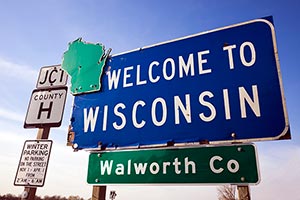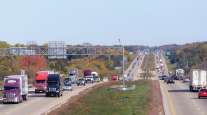Wisconsin Lawmakers Buck Gov. Scott Walker, Drop His Transportation Plan From Budget

In a move not seen in at least 24 years, top Wisconsin lawmakers yanked dozens of provisions from Gov. Scott Walker's budget bill, including the entire transportation plan put forward by their fellow Republican.
That last move means GOP lawmakers on their own will either reach a compromise on how to fund highways and bridges or face a tight transportation budget with dramatic delays on the Zoo Interchange and other projects around the state.
The co-chairs of the Legislature's budget committee, Sen. Alberta Darling (R-River Hills) and Rep. John Nygren (R-Marinette), removed every policy item in Walker's budget that didn't have a direct financial impact for the state. Lawmakers haven't done that to a budget from a governor of their own party since some time before 1993, according to the Legislature's nonpartisan budget office.
The move drew praise from budget purists who argue that the public doesn't get to weigh in on policy when it gets stuffed into the state's tax and spending plan.
“I strongly applaud the move," Sen. Rob Cowles (R-Allouez) said in a statement. "I have said, for several budgets, that these items should all be stripped out and discussed through the committee process with public input, as separate legislation."
As the co-chairs of the Joint Finance Committee, Nygren and Darling have broad powers to work with the Legislative Fiscal Bureau to identify policy items that don't directly affect the state's finances and remove them from the governor's proposed budget.
In a statement, Walker spokesman Tom Evenson said the governor is pleased that lawmakers had kept his school funding plan and "welcomes the opportunity to work with lawmakers" on road funding.
"He is open to many different options as long as they don't include an increase in the gas tax," Evenson said.
Sen. Scott Fitzgerald seeks other funding sources for Wisconsin's roads.
In dropping the governor’s transportation plan, Darling and Nygren essentially signaled they would start from scratch.
So for now, at least, lawmakers aren’t going along with the large increases in aid for local government roads that Walker had proposed. Lawmakers will also start their deliberations assuming they won’t borrow more money for highways. Walker had sought $500 million in loans for those projects.
Under this new scenario, work on the Zoo Interchange and Interstate 94 south of Milwaukee would be delayed because just $15 million would be available for massive projects in southeast Wisconsin over the next two years. The state would also spend $185 million less than Walker wants on other major projects around Wisconsin — a daunting prospect that could lead to more deal-making by lawmakers.
“A base budget basically creates the prospect of a crisis in every corner of Wisconsin,” said Pat Goss, executive director of the Wisconsin Transportation Builders Association.




